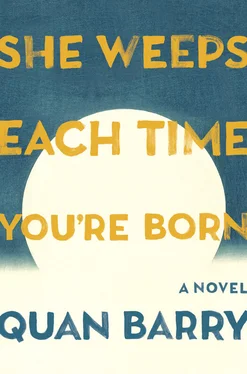On the other side of the truck Grischa was awake. He looked at Rabbit and nodded. She could feel his eyes on her as if he were trying to connect the freckles on her face and find a pattern. She wondered if he were worried about how they would sneak her out into the fields. Before they had even boarded the trucks, he had explained the situation to Giang. The Commandant has a house in the Russian quarter in Hoa Thien, Grischa said. He raised his eyebrows and held his hands up palms to the sky as if testing the air for rain. None of us have seen him in weeks. Giang looked at him, but Grischa simply nodded. I know I know, he said. Why go out there every day if no one is watching us? He lowered his hands and shrugged. We Russians and our suffering, he said.
Then Rabbit could feel them rising, the sound of the trucks switching gears. Out of the back she could see people walking downhill into town. She closed her eyes and imagined a young woman riding a bicycle, her long black hair streaming in the wind, the woman’s conical hat blowing off as she raced past a group of water buffalo. A young man standing in a ditch by the side of the road, watching the woman, the small red diamond staining his face, his heart flooding.
When Rabbit opened her eyes again, they were there. Two men helped her and Giang out of the truck. The sun was just over the hills, but overhead there was a three-quarters moon in the pale blue sky. In the daytime it was just a ghost of itself.
The Russians from the other trucks were already organizing themselves for the day. One man stood with headphones draped around his neck and a large metal machine by his side. She saw four other men with headsets, each one connected to the same kind of machine, each instrument long and cylindrical like the vacuum cleaners she’d seen once in a window in Hanoi.
The dogs looked anxious. Their handlers stood a few feet away poring over a map. The dogs kept their eyes on the men. One of the smaller dogs passed too closely to another. The bigger dog let out a deep growl and bared its teeth. The smaller dog quickly moved out of the way, its tail between its legs. Rabbit could see a scar on the smaller dog’s muzzle, a spot where the fur no longer grew. Something about it reminded her of Son. She looked around but didn’t see him anywhere.
For all the climbing the trucks had done out on Highway 19, the land was surprisingly flat, as if they were standing in the bottom of a bowl. In the distance the mountains and rolling hills looked like turrets. She wondered why anyone had ever chosen to fight there. Whoever had the highlands would hold the advantage. If you were down in the bottomlands, it would only be a matter of time. Even she could tell that.
After a while the various groups began to move off. Each man had his task. There were close to a hundred of them in all. Some carried shovels and buckets, some with metal detectors, which they carried on their shoulders, some straining to hold the dogs back. At the front of each group a man walked holding only a map, the responsibility evident in the slowness of his movements.
Grischa came over and spoke with Giang. He had one of the dogs with him. Rabbit offered it her hand, but the dog growled and flattened its ears. Laika, barked Grischa, tugging the leash. Giang looked at Rabbit. You ready, she said. Rabbit nodded. With her hands Giang twisted her loose hair up into a knot. Rabbit could see a small mark on Giang’s neck, the mark as if someone had bitten her. Grischa says stay single file, Giang said. No matter what, stay in line. Rabbit pushed her hat back out of her eyes and took a deep breath.
It was a thirty-minute walk to the trenches of Anne-Marie. They walked on the airstrip, the asphalt long decayed and overgrown by shoulder-tall plants with small green berries gleaming in clusters. Grischa yelled something over his shoulder. Coffee beans, Giang said. To the east the land was dotted with orange flags. The Russians had been working different areas for the last year, looking for the French dead. The Vietnamese government was eager to normalize relations with their former colonizer, bodies offered up as a sign of goodwill. Repatriation was one step in a long process.
Their group was small, just six of them plus the dog. One man carried the metal detector. Two other soldiers were toting shovels. They looked like boys, barely teenagers, their skin ruddy and somewhat blemished. A few orange flags poked out of their pockets. Grischa was still holding the leash, Laika trotting by his side. Rabbit could see something rolled up tight and tucked under Grischa’s other arm, the thing shiny and black. In her mind a memory floated up of a black bag lying on the ground under a sugar-apple tree, beside it a hole growing in the earth. There was a body zipped up in the bag. She knew there was a body inside the body.
As they walked Grischa explained procedures to Giang, who translated intermittently. In each sector they would first sweep the land for unexploded ordnance. Afterward they would detonate the larger bombs, only defusing things when it was absolutely necessary. There was so much left in the ground that they would mark the smaller incidents with flags and leave them be. Once an area had been marked, they would come through with the dogs. If the dogs scented something, then they would begin digging.
The two women walked along, everywhere cicadas buzzing like invisible engines in the grass. At one point Giang stopped to tip a pebble out of one of her shoes. Rabbit stood waiting for her to begin moving again. Why do you speak Russian, she said.
For a moment Giang stood studying her heel. I grew up in Russia, she said. I was born in Stalingrad. Rabbit waited for her to say more, but she put her shoe back on and started walking again.
Soon they were beyond the airstrip. The grass was a dull brown from years of chemicals leaching into the soil. My father was a party leader, Giang suddenly said. When I was twelve, my parents were killed in a car accident. Rabbit remembered the faint voices rising off Giang’s skin when she had held her hand back in the dorm. So I came back to Vietnam, she said. After my grandmother died, I was on my own. She turned and smiled at Rabbit. At least I’m keeping up my Russian. She laughed, but Rabbit could see the effort it cost her.
Now that she knew the circumstances Rabbit could put it all together. The voices she had heard as she held Giang’s hand had been crying out for acknowledgment. Giang’s father closing his eyes as he pushed down on the gas, steering the car into a guardrail. His wife sleeping beside him, only rousing herself at the last moment, her eyes shocked open. In the husband’s mind the desperation and the feeling that there was nothing left to do. The wife didn’t think he knew, but he knew. He had always known about all of them. The low-ranking Russian colonel just the latest in her endless string of lovers.
They were only a few hundred feet from the spot where Levka was last seen when Rabbit stepped on one. She felt the air rush out of her lungs. Someone’s here, she said, rubbing her ears. Giang let out a sharp whistle. The Russians turned around and came back. Giang tapped the ground with her foot. Здесь кто-то есть. The men huddled and talked among themselves. Impossible, Grischa said. He pointed to a spot up the trail. They were up by that grove when we last saw them. Giang kept tapping the ground. Grischa sighed and said something to the dog. Laika sniffed around, then squatted and urinated. The other men laughed. Please, said Rabbit, but nobody moved.
Giang reached over and grabbed a shovel from one of the boys. Without another word she began digging. Grischa pulled out a pack of cigarettes. He struck a match along the bottom of his work boot. The flame burst forth with a loud hiss. The men sat down on the ground. The man carrying the metal detector said something to one of the other soldiers and sniggered.
Читать дальше












